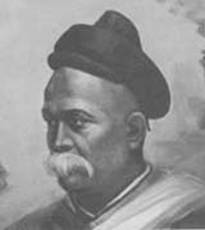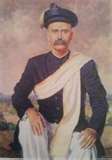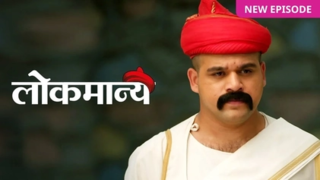Related Research Articles

Bal Gangadhar Tilak, endeared as Lokmanya, was an Indian nationalist, teacher, and an independence activist. He was one third of the Lal Bal Pal triumvirate. The British colonial authorities called him "The father of the Indian unrest". He was also conferred with the title of "Lokmanya", which means "accepted by the people as their leader". Mahatma Gandhi called him "The Maker of Modern India".

Gopal Krishna Gokhale was an Indian political leader and a social reformer during the Indian independence movement and political mentor of Indian freedom fighter Mahatma Gandhi. He was also the mentor of Muhammad Ali Jinnah.

Ganesh Chaturthi, also known as Vinayak Chaturthi or Ganeshotsav, is a Hindu festival commemorating the birth of the Hindu god Ganesha. The festival is marked with the installation of Ganesha's clay idols privately in homes and publicly on elaborate pandals. Observances include chanting of Vedic hymns and Hindu texts, such as prayers and vrata (fasting). Offerings and prasada from the daily prayers, that are distributed from the pandal to the community, include sweets such as modaka as it is believed to be a favourite of Ganesha. The festival ends on the tenth day after start, when the idol is carried in a public procession with music and group chanting, then immersed in a nearby body of water such as a river or sea, called visarjan on the day of Anant Chaturdashi. In Mumbai alone, around 150,000 statues are immersed annually. Thereafter the clay idol dissolves and Ganesha is believed to return to his celestial abode.

Fergusson College is an autonomous public-private college offering various courses in the streams of arts and science in the city of Pune, India. It was founded in 1885 by the Vaman Shriram Apte, Bal Gangadhar Tilak, Vishnushashtri Chiplunkar, Mahadeo Ballal Namjoshi and Gopal Krishna Agarkar. Professor Vaman Shivram Apte was its first principal. Social reformer, journalist, thinker and educationist Gopal Ganesh Agarkar served as the second principal from August 1892, till his death in June 1895.

Rao Bahadur Mahadev Govind Ranade, popularly referred to as Nyayamurti Ranade or Justice Ranade, was an Indian scholar, social reformer, judge and author. He was one of the founding members of the Indian National Congress party and owned several designations like Member of The Bombay Legislative Council and Member of The Finance Committee at the centre. He was also a judge of the Bombay High Court, Maharashtra.

The Chitpavan Brahmin or the Konkanastha Brahmin is a Hindu Maharashtrian Brahmin community inhabiting Konkan, the coastal region of the state of Maharashtra. Initially working as messengers and spies in the late seventeenth century, the community came into prominence during the 18th century when the heirs of Peshwa from the Bhat family of Balaji Vishwanath became the de facto rulers of the Maratha empire. Until the 18th century, the Chitpavans were held in low esteem by the Deshastha, the older established Brahmin community of Karnataka-Maharashtra region.

Kesari is a Marathi newspaper which was founded on 4 January 1881 by Lokmanya Bal Gangadhar Tilak, a prominent leader of the Indian Independence movement. The newspaper was used as a spokes piece for the Indian national freedom movement, and continues to be published by the Kesari Maratha Trust and Tilak's descendants.

Gopal Ganesh Agarkar was a social reformer, educationist, and thinker from Bombay Presidency, British India.
Ganesh Vasudeo Joshi, popularly known as Sarwajanik Kaka, was a lawyer, social reformer, and political activist. He was a founding member of Poona Sarvajanik Sabha. He was a great support system for the noble works initiated and carried out successfully by Honorable Justice Mahadev Govind Ranade. He was a social activist in Pune when Maharashtrian revival began, and he was the elderly guiding philosopher when Tilak and Agarkar's generation gave impetus to Indian independence struggle. Joshi also represented Vasudev Balwant Phadke as his lawyer in Phadke's trial.
Pune is the 9th most populous city in India and one of the largest in the state of Maharashtra. The history of the city is closely related to the rise of the Maratha empire from the 17th–18th century. During the 18th century, Pune became the political centre of the Indian subcontinent; as the seat of the Peshwas, who were the prime ministers of the Maratha Empire.
Ganesh Srikrishna Khaparde was an Indian lawyer, scholar, political activist and a noted devotee of Shirdi Sai Baba and saint Gajanan Maharaj.

Madhav Shrihari Aney ; popularly referred to as Loknayak Bapuji Aney or Bapuji Aney, was an ardent educationist, freedom fighter, statesman, a modern Sanskrit poet and a politician. He was also conferred with the title of "Loknayak Bapuji", which means "The People's Leader and Respected Father". He was one of the founders of the Congress Nationalist Party. He was first among the eminent disciples of Lokmanya Tilak such as N C Kelkar, Kakasaheb Khadilkar, Gangadhar Deshpande, Dr B S Munje, Abhyankar, T B Paranjpe and Vaman Malhar Joshi, who walked in the footsteps of Tilak. Accepting the leadership of Mahatma Gandhi on the death of Bal Gangadhar Tilak. Aney persuaded his colleagues to see the writing on the wall. At the same time he was not blind in his loyalty. He disapproved Congress throwing itself in Khilafat Movement and warned against excessive wooing of Muslims at the cost of national interests. He regarded unity at any price as elusive and dangerous. Since the best safeguard for the minority was the goodwill of the majority. He never permitted his critical faculties to be blurred by emotion. Mahatma Gandhi admiring his calm logic, confided in him and often sought his counsel. He was chosen to arbitrate the disputes between Subhash Chandra Bose and Jatindra Mohan Sengupta. He was never a breaker or a destroyer but was always a cementing factor believing in synthesis and not in segregation.
Krushnaji Prabhakar Khadilkar was a Marathi writer from Bombay Presidency, British IndiaIndia. George calls him "a prominent lieutenant of Lokmanya Tilak". He was editor of Kesari, Lokmanya and Navakal. The subject of navakal is political, trade and market price Khadilkar in the beginning of his career wrote prose-plays, but achieved "even greater recognition" with plays like Svayamvara – which had songs which were based on Indian classical music. The notability of his dramatic technique, in his fifteen plays, was to "endow ancient Hindu legends and tales with contemporary political significance". The Encyclopaedia of Indian Literature, remarks that while Annasaheb Kirloskar "laid the foundation of popular sangit natak", it saw its great rise and gradual decline with the advent of Khadilkar. It considers Khadilkar along with Bal Gandharva as "the architect of what later on came to be called the golden age of the Marathi drama".
Vaman Malhar Joshi was a Marathi writer from Bombay Presidency, British India.

Poona Sarvajanik Sabha,, was a sociopolitical organisation in British Raj which started with the aim of working as a mediating body between the government and people of India and to popularise the peasants' legal rights.

Lokmanya is an Indian Marathi language historical biopic series. It starred Kshitish Date and Spruha Joshi in lead roles. It is produced under the banner of Dashami Creations. The show premiered from 21 December 2022 airing Wednesday to Saturday on Zee Marathi.
References
- 1 2 3 Wolpert, Stanley (1962). Tilak and Gokhale: Revolution and Reform in the Making of Modern India . University of California Press. p. 326.
vasukaka.
- ↑ Hulsurkar, Tejaswini (27 April 2008). "Denarya Hatancha Udtyojak: Vasukaka Joshi". Maharashtra Times (in Marathi). Mumbai . Retrieved 18 August 2014.
- ↑ Ganachari, Aravind (2005). Nationalism and Social Reform in Colonial Situation. Gyan Publishing House. ISBN 9788178353517.
- 1 2 Sen 1973, p. 345.
Bibliography
- Sen, S.P. (1973). Dictionary of National Biography. Institute of Historical Studies, Calcutta.